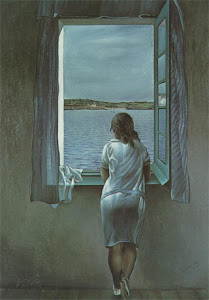Let me tell you a little story
About Miss Edith Gee;
She lived in Clevedon Terrace
At Number 83.
She’d a slight squint in her left eye,
Her lips they were thin and small,
She had narrow sloping shoulders
And she had no bust at all.
She’d a velvet hat with trimmings,
And a dark grey serge costume;
She lived in Clevedon Terrace
In a small bed-sitting room.
She’d a purple mac for wet days,
A green umbrella too to take,
She’d a bicycle with shopping basket
And a harsh back-pedal brake.
The Church of Saint Aloysius
Was not very far;
She did a lot of knitting,
Knitting for that Church Bazaar.
Miss Gee looked up at the starlight
And said, “Does anyone care
That I live on Clevedon Terrace
On one hundred pounds a year?”
She dreamed a dream one evening
That she was the Queen of France
And the Vicar of Saint Aloysius
Asked her Majesty to dance.
But a storm blew down the palace,
She was biking through a field of corn,
And a bull with the face of the Vicar
Was charging with lowered horn.
She could feel his hot breath behind her,
He was going to overtake;
And the bicycle went slower and slower
Because of that back-pedal brake.
Summer made the trees a picture,
Winter made them a wreck;
She bicycled to the evening service
With her clothes buttoned up to her neck.
She passed by the loving couples,
She turned her head away;
She passed by the loving couples
And they didn’t ask her to stay.
Miss Gee sat down in the side-aisle,
She heard the organ play;
And the choir it sang so sweetly
At the ending of the day,
Miss Gee knelt down in the side-aisle,
She knelt down on her knees;
“Lead me not into temptation
But make me a good girl, please.”
The days and nights went by her
Like waves round a Cornish wreck;
She bicycled down to the doctor
With her clothes buttoned up to her neck.
She bicycled down to the doctor,
And rand the surgery bell;
“O, doctor, I’ve a pain inside me,
And I don’t feel very well.”
Doctor Thomas looked her over,
And then he looked some more;
Walked over to his wash-basin,
Said, “Why didn’t you come before?”
Doctor Thomas sat over his dinner,
Though his wife was waiting to ring,
Rolling his bread into pellets;
Said, ”Cancer’s a funny thing.
Nobody knows what the cause is,
Though some pretend they do;
It’s like some hidden assassin
Waiting to strike at you.
Childless women get it
And men when they retire;
It’s as if there had to be some outlet
For their foiled creative fire.”
His wife she rang for the servant,
Said, “Don’t be so morbid, dear.”
He said, “I saw Miss Gee this evening
And she’s a goner, I fear.”
They took Miss Gee to the hospital,
She lay there a total wreck,
Lay in the ward for women
With the bedclothes right up to her neck.
They laid her on the table,
The students began to laugh;
And Mr. Rose the surgeon
He cut Miss Gee in half.
Mr. Rose he turned to his student,
Said, “Gentlemen, if you please,
We seldom see a sarcoma
As far advanced as this.”
They took off the table,
They wheeled away Miss Gee
Down to another department
Where they study Anatomy.
They hung her from the ceiling,
Yes, they hung up Miss Gee;
And a couple of Oxford Groupers
Carefully dissected her knee.
W. H. Auden






